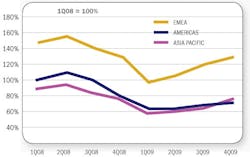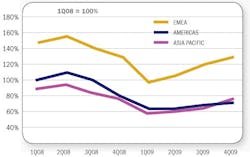Extended Machine Vision Outlook Is Good
The worst of the recession is over for machine vision, according to a report on the industry published by IMS Research (www.imsresearch.com) in Wellingborough, U.K. The report estimated that the world market enjoyed revenues of nearly $2.5 billion in 2008 but was slashed by more than 25% in 2009, equating to around $500 million of hardware sales being lost.
"Machine vision suffered more from the downturn in industrial production than industrial automation in general," commented John Morse, senior market analyst, automation & control group, and author of the report. "However, there were significant differences between geographic regions and industries. There were a few companies interviewed for the report that saw growth in 2009; but the ones that suffered the most were suppliers to manufacturing, particularly to the automotive and machine tool sectors."
The reduction in machine vision revenues varied a great deal during 2009, with machine tools and any industry related to automotive taking the biggest hit, explained Morse. "Industries in the utilities sectors were affected the least with transport and traffic probably being affected the least," he said. Geographically, the reduction in machine vision revenues in Asia Pacific was the greatest. "This is principally due to the particularly severe recession in Japan, which accounts for around 40% of the region's machine vision business," said Morse. The recovery in the Americas appears to be gaining pace faster than the other regions, although it is early and recovery may not be sustained.
"It's not all bad news," continued Morse. "Most of the industry appears to have survived and many suppliers have seen orders pick up in January 2010. Many are optimistic that growth will be sustained; however, it is most likely that recovery will be steady rather than meteoric. The time when revenues return to their 2008 levels is very dependent on the industries served. The very earliest is likely to be 2011, with some sectors unlikely to recover before the end of the report's forecast period in 2013."
GLOBAL PERSPECTIVE

